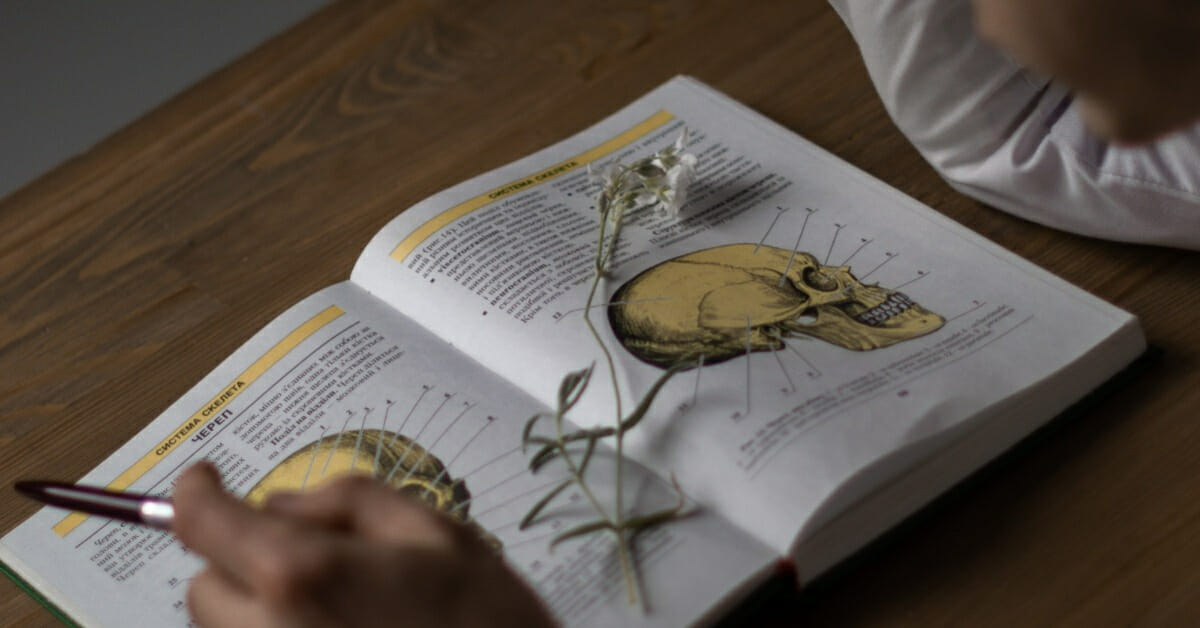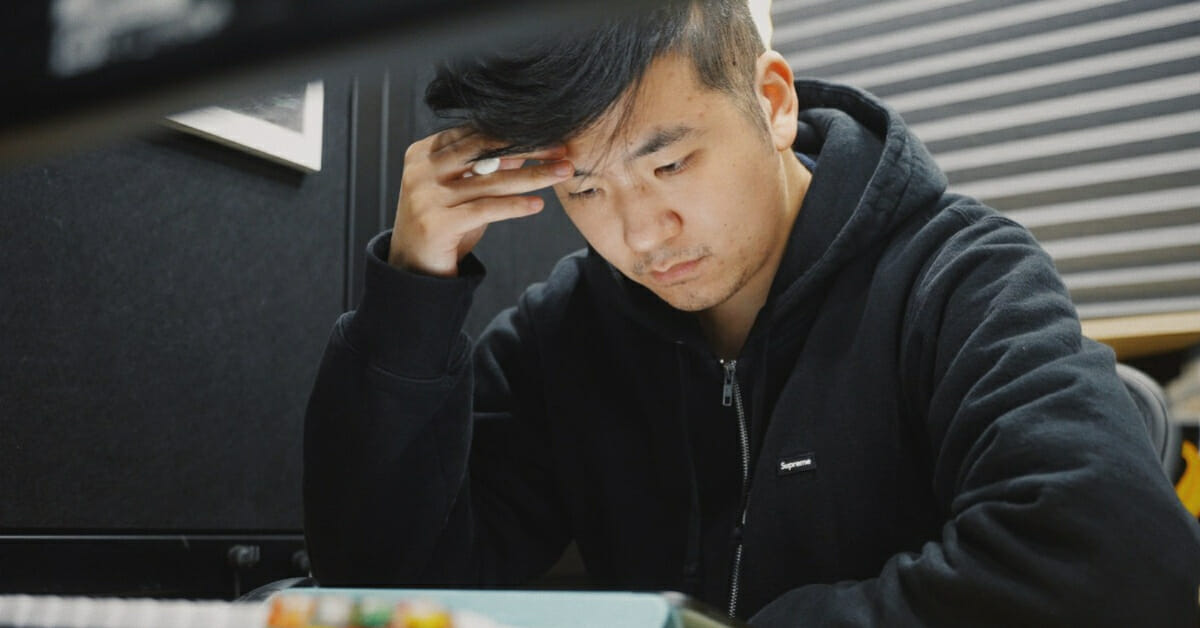Exam season is on the horizon. You’re sitting hunched over, neck extended forward, eyes staring at your laptop screen. After studying for hours on end, you finally get up, feeling delirious, with a looming headache, then try to go to bed to wake up to do the same thing over again the next day, repeating until exams are over. When you finally reach the end of all of your exams, your eyes are drained of life and you need to catch up on two weeks of sleep.
This is not an uncommon scenario for most medical students; however, it should not be normalized, as it is an unhealthy habit that could lead to an unhealthy lifestyle. There are methods for keeping you sane and in better health during such intense study periods. Proper planning and self-care can be combined to create less stressful and more effective studying habits.
Stop Studying in Bed: The Importance of a good study environment
It is imperative to have a designated, organized study space. Always studying in a set space helps get you into a studying mood. Whether it’s a home office or a specific spot in the library, having that space and going there every day to study helps you form a habit of concentration once you’re in that space.
A bed, a couch, or any place of leisure or relaxation should not be used as a study space at home. Such places may amplify distractions and revert concentration to relaxation. It’s best to establish a study space that is well lit, quiet, and secluded from diversions to maintain better focus.
Your study area should be set up with everything you may need: laptop, paper, pen, water, headphones, etc. Sometimes less is more: To lessen distractions and better engage yourself, have only what you will actually use to get your studying done.
Study Ergonomics: How to Sit While Studying
Now that your study space is all set up, you’re ready to get started, but what happens when you’re sitting hunched over a desk for hours and hours? It’s important to keep in mind proper ergonomics while studying.
Ergonomics is an applied science that looks at the design and arrangement of things people use and has the goal of promoting efficient, safe, and healthy use of these things.
Studies show that practicing ergonomic principles is beneficial for health, lowering the risk of musculoskeletal disorders, and for productivity. Such research has found that ergonomic practices reduce pain and stress levels and enhance productivity, allowing completion of tasks more quickly and efficiently.

Good posture
One way to follow ergonomic principles while performing desk work is having a balanced posture. Sit with a straight back and neck, and make sure your lower back is properly supported. Your legs should be bent at 90 degrees at the knees and your feet stable on the floor. Your arms should be next to your body and bent at a 90-degree angle at the elbows. Rest your forearms on the table.
Keep moving!
The essence of ergonomics is adopting a variety of positions to lessen the strain on your body of staying in one position for a long duration. A way to vary your posture and movements while studying is by using an adjustable standing desk. Getting up every now and then and changing locations from studying at a desk to on the floor, or even walking around from time to time are other ways to take the strain off.
Studying medicine has never been easier.
Set yourself up for success with Lecturio.
What to Do During Study Breaks
Once you’re in your study space, it may be easy to get stuck in the zone, and keep pushing through to get whatever you may need to get done. This can become tiring day after day and end up taxing your body if you make it a habit. While it may be tempting to continue studying, it is very important to take breaks and make the most of them. Depending on how long it may take to complete a task, timing and spacing breaks can help in both relaxing yourself and making your studying more efficient, possibly allowing you to complete study tasks quicker.
Here are a few suggestions on what to do during breaks:
Move around
It is super important to get moving during break time! Sitting in the same stationary position for hours can be very detrimental to the body. Standing up or going for a walk, even for just five minutes, is beneficial for proper circulation throughout the body to carry you through the rest of the day.
Stretch
It is also important to stretch the body. This allows proper blood flow and relaxation from tense periods of staying in the same position while studying. Many people forget to stretch their bodies, resulting in back pain and neck pain, for example, over time. Moving about, stretching, and proper ergonomic positioning while studying can lead to physically healthier study habits, thus preventing chronic pain in the long run. I learned to practice proper posture while at my desk, as I would slouch and extend my neck too far forward, which led to tension headaches. Straightening my posture and performing neck stretches during my breaks helped prevent further pain that would have otherwise distracted me from studying.
Eat and hydrate
Sometimes when we’re busy and always on the go, focused on our own stuff, we forget one of the simplest things: EATING. In med school, I have been guilty of and have witnessed many students skip essentials such as eating or drinking water just to get extra time to study and later crash after becoming so tired. This is super unhealthy for anyone! Would we tell our future patients that this lifestyle is good for them? Not at all.
I had a friend who told me that I was not taking care of myself, because I would just study and not eat and end up feeling faint by the end of the day.
Food is fuel!
In order to go on, you need to recharge, which is what a break is, but how you spend it is also important. Eating is refueling your energy tank to keep on working, so remember to do it! Having snacks or meals during breaks is important in keeping your energy levels up.
Meditate
With so many tasks to complete and daily schedules to get through, we may not have time to allow for either our bodies or our minds to relax. Sometimes we think of the next thing we have to do instead of clearing our minds during breaks, using the break to look ahead rather than reset. While I was studying for boards, a senior classmate of mine suggested practicing meditation and fitting it into my dedicated study schedule. I kept this in mind (no pun intended) and have been practicing it since then.
Have you ever kept your laptop on for days and then had malfunctions along the way, but upon shutting it down or restarting it, the laptop works as good as new? When you meditate, you are able to clear your mind of whatever may be clogging it – whether it may be anxiety about things you need to get done or a big test ahead, or even non academic-related worries. Meditation serves as a way to recenter and refocus.
Socialize
Studying can be tiring, especially when in completely silent isolation. Socializing or just chatting with a family member, friend, or even classmate for a few minutes during your break can be a good use of your time. It can get your mind off your tasks. Talking to others may also help you remember that, in all you may be working toward, you have the support of those around you. Just remember not to get too carried away in conversation and to come back from the break to get your work done.
Manage your time
Giving yourself an allowance of time to spend per block of studying is a good way to organize your time and keep yourself accountable in time management. Personally, I study for two hours, then spend twenty to thirty minutes on a break, and then return to studying for another two hours. Others may do a different combination of an hour of work to fifteen minutes of break. Do what works best for you! Everyone is different. The key is to work out what’s a sustainable amount of studying time for you, and then follow this with a set break time to recharge.
Take Care of Yourself
Practicing proper self-care by studying in a clean, focused space, following ergonomic principles, and taking breaks can help you be more efficient in studying. Feeling refreshed will help you tackle your study tasks, getting it done faster – who doesn’t want that?





